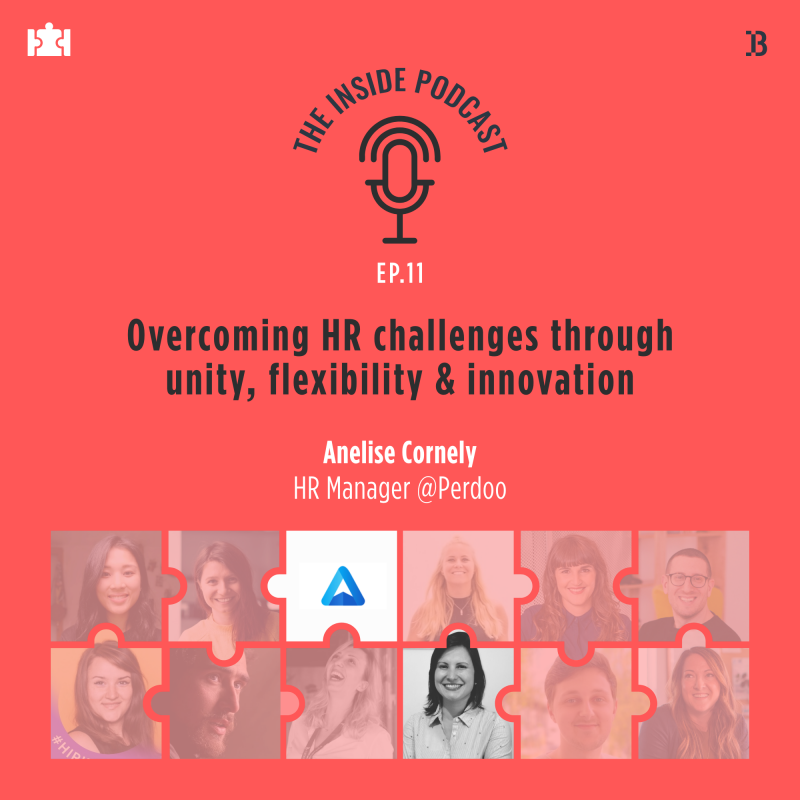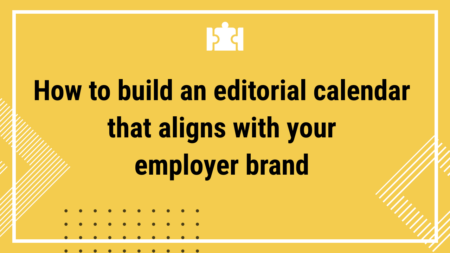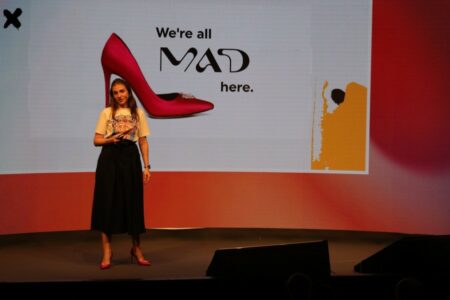Overview
In Ep. 11 of The Inside Podcast, you’ll be listening to Anelise Cornely, HR Manager at Perdoo, talk about her role in the company, but also about HR perks, challenges, and other key ingredients that keep her team united.
What you’ll learn by listening
- What it’s like to be an HR manager in a startup – every little change you make matters!
- Culture & values – the glue that keeps teams united
- The perks of HR management in a small team – autonomy, no micromanagement
- The importance of having a company culture defined by leaders
- Overcoming challenges through the power of unity, flexibility, and innovation
About the company
90% of organizations fail to execute their strategies successfully. They don’t communicate their strategy in a clear and easy-to-understand way, making it impossible for their teams to translate the long-term strategy into short-term goals. This results in over 70% of employees being misaligned with their company’s strategic direction.
With the first fully free goal management software worldwide, Perdoo is democratizing business success and enabling any organization out there to implement OKR – the secret sauce behind the success of companies such as Google, Intel or LinkedIn.
Enjoy listening to Ep.11 of The Inside Podcast on Spotify!
Podcast transcription – Overcoming HR challenges through unity, flexibility & innovation with Anelise Cornely @Perdoo
Georgiana: Hi, everyone! This is Georgiana, as you already know, from Employer Branding: The Inside Podcast, where we talk to HR professionals from tech companies in Berlin and Bucharest, employer branding managers, talent acquisition managers, and everyone who has insights into what it’s like to work in this vast environment of tech people.
And today we talk with Anelise Cornely, who is HR manager at Perdoo. She will be discussing with us her role in the company and the struggles she goes through. And please, Anelise, maybe you can first tell me if I pronounced your name correctly. And secondly, you can tell us what you do. What does your role on a daily basis entail?
Anelise Cornely: Yeah, sure. So you’re pronouncing my name correctly. And just to tell you a little more about Perdoo as well, it is a goal management platform that helps organizations bridge the strategy and execution gap by bringing their strategy, people and goals; main goals – that we understand as OKRs and KPIs – onto a single platform. So that’s what Perdoo does.
As the HR manager there, I’m responsible for growing our amazing team and enabling everyone to do their best work. I take care of HR admin, employee lifecycle, from onboarding to offboarding, recruiting, and office management. Overall, I’m the go-to person for the entire team, responsible for maintaining awesome company culture, and building our employer branding, as well. So yeah, it’s a little bit of everything.
Georgiana: It’s like the classical startup situation, right? Because this is actually why you are talking to me today. Tell me a bit about yourself. You worked in a bunch of various roles before coming to Berlin from Brazil. So please let me know why you picked this amazing city.
Anelise Cornely: Yeah, true. Just to tell you a little more about me. I started my career after I finished my studies. I studied psychology. And I’ve always been passionate about working with people. I always knew I wanted to do something in that area. I discovered HR actually, during university by doing some internships. Then I worked for a few companies that are in my hometown in Brazil. Right after I finished my graduation, I had the opportunity to go abroad and ended up living and working for three years in Mumbai, in India. That was an amazing experience for me, definitely. And it was like my foundation in HR because it was one of my first professional experiences.
It was really amazing to learn HR, as well as learning a different culture at the same time and knowing different people. It was a really fantastic experience. I moved back to Brazil after three years, and I continued working in HR for large and small organizations. I worked for some startups, as well as big companies. And I got married in 2017.
And me and my husband, we used to always discuss that we wanted to leave Brazil again. So for me, it would be the second time and for him, it would be the first. We’ve been always discussing that, because we have a lot of quality living issues in Brazil, things are not very stable there. We knew we wanted to have a better quality of living. So we started looking at opportunities.
I think that once you live abroad, you always have that thing in the back of your mind that you want to do it again, have that experience again. I feel that after you live abroad once, you kind of want to move around. And then finally, he got a job here in Berlin. We moved here in March last year. Berlin was always for us one of the cities that we were targeting because Berlin is so diverse, so multicultural, so vibrant.
Georgiana: Oh, yes, exactly. But tell me, Anelise, what is it like to be an HR manager in a startup? You said it’s a bit of everything. How exactly?
Anelise Cornely: I guess it’s really different from working in big companies because I’ve had experience in both. And I would say that in large companies, we usually have a team, where each one specializes in something; you will have someone for recruitment, compensation, payroll, and all different areas. And also, usually, the processes and structures are in place. Basically, you arrive in the company and everything is already set. It’s more about ensuring compliance with the current processes and policies and maintaining the status quo. You don’t always have the liberty to propose things and innovate much.
I think it’s different in a startup because many things have to be created from scratch. It gives you a lot more space to be creative and build things. That’s really amazing, I really love that. And at the same time, everything that you do in a startup has more impact. From my point of view, a small change will have more results for the team. For example, right now, in Perdoo, we’re a team of 15 employees. Every small thing you do is visible to everyone. You really have to be very, very careful with every small change. In a big company, sometimes you change something, and it will take really long for everyone to know that it’s changed.
I feel that culture and values have a lot more significance in a startup than in a larger company because that’s what bonds the team together. That’s one thing I really love about working in startups. You have to have a very strong company culture and values. I love that.
Anelise Cornely
Georgiana: Would you say this is your favorite part about the job? Or is there something else you love? Aside from this?
Anelise Cornely: I would say this is one of my favorite parts. And especially when it comes to Perdoo, I would say that this is why I took the role. I joined for two main reasons. One was because of the team size – I really enjoy the opportunity to work in a small team because you get a lot of autonomy; there’s no micromanagement. I’m the only HR on the team, and that gives me a lot of freedom to do things the way I believe they should be done.
At the same time, I report to the CEO. I have a very close relationship with him, and that means that I can get really close to the company’s strategy. That’s really interesting. And last but not least, the product that we offer because I’ve always been a very goal-driven person myself. I really believe that purpose is what drives people. At the same time, I love knowing that we are able to impact many organizations to be more successful, and knowing that I have a relevant role in this by building and keeping a strong and smart team together. That makes me very fulfilled – knowing that my work has an impact in the company.
Georgiana: I suppose having a job that’s impactful really, really matters. I absolutely agree. However, there must have been harder times in your career so far. If you were to pick the hardest thing you’ve ever had to do? What was it?
Anelise Cornely: There were tough things I had to do. So I think overall in HR, from all my experience, the hardest part is always deciding to let people go. That’s the toughest part, even though it’s not a decision taken solely by HR. But I think we’re always part of that discussion, of the execution as well. For me, it’s very, very difficult to handle. And there was a specific situation in a startup I worked in, in Brazil, in 2018. I worked there for seven months, and unfortunately, the company failed, as many startups do. They had to close down. And it was extremely difficult for me for three reasons.
I would say the first one is, of course, because I knew I was going to get fired. Secondly, I knew that the whole team was being fired. That was really hard for me to take in. And, also, I knew that I had been responsible for bringing those people on board in the first place. I was feeling very guilty because maybe I could have known, you know, that things were not doing fine. I was just feeling that I was part of the whole thing. And many people had families, children, and they left their jobs.
That was painful, I would say that I spent like a week after that, still trying to recover from the whole situation, because it all was extremely hard for me.
Georgiana: You know, as a startup founder, actually, I absolutely relate to what you are telling me. I’ve had to fire my share of people in my years as an agency founder. And I’ve said it before, it’s the hardest thing I’ve ever had to do. I mean, we cried at some point together. In a small team, things are so personal, and everything is so personal, although the decision isn’t necessarily something that I take on my own. Still, I feel connected to those people. And it’s hard to bring that piece of news, always. Okay, getting back to something not so sentimental, a book that you found influential.
Anelise Cornely: Okay, that’s a good question. Um, I love reading first of all, so not only HR-related stuff, but overall. I set myself a goal. I try to read at least a book per month. Right now I’m reading Radical Candour (Kim Scott). And I think that’s one book I would recommend to people. It’s not exactly about HR, I think it’s for anyone who manages a team.
It’s very straightforward about what’s the best way to give feedback to people. I think that’s something everyone has to do at some point in their careers. I would say that’s really an interesting book. But I also, as I said, like to read things that are not related to HR. Last year, I was reading a lot of philosophy. And, also, I like books about mindfulness, which is something I’m really interested in. And yeah, but I would say that overall, more than books, I think the people that I’ve met in my career are the ones who influenced me the most. Of course, books are always helpful. But the people we meet, also teach us a lot.
Georgiana: Speaking of Radical Candor, I have to admit I’ve had the sample of it in my Kindle for quite a while. I wasn’t entirely sure whether I should purchase the book, but now I will because I like the short introduction that I read. So thank you for confirming what I somehow already knew.
Anelise Cornely: Yeah, it’s always very nice at Perdoo, we have a library where we have a few books and employees can just pick them and they just read them for a while. Radical Candor was there.
Georgiana: Another one of my questions is regarding tips for preserving healthy company culture. Well, you’ve discussed I think, part of this, but is there anything else in specific that you can think of when you say healthy company culture, regardless of the country?
Anelise Cornely: I think culture, no matter the size of the organization, is always a critical topic for HR and for everyone in general. But I tend to believe that there is an explicit culture, that is the one that comes from top to bottom, and is usually written in the notice boards, and you know, is the thing that you see and read everywhere, along with the values.
There is an implicit one, which usually goes bottom up. I think it talks more about the work atmosphere, the rituals that we follow, the do’s and don’ts in the company, which are things that are not written, are not said sometimes. That’s why I believe that company culture is something that needs to be put into practice by top leadership. I think they need to give the example, they need to walk the talk. And at the same time, culture is something live and it needs to be flexible, in my opinion.
You have to review your company culture from time to time, based on the changes that every company goes through with time, and because the culture should reflect your reality, and vice versa. If not, there’s something really wrong there. And I also believe that culture is something that unites the people, no matter how spread they are across the globe. It’s something that we have in common. So it’s important to keep it.
Georgiana: I think having a dynamic culture is something that leaders should embrace in order to improve the corporate climate in so many ways in many companies. Yeah, culture definitely grows with the company. Just to shift a little bit from HR, but not necessarily, what would you say are our three big problems that businesses face today? In your opinion?
Anelise Cornely: From our experience at Perdoo, I think the moment we’re living right now is very unique. There are so many changes happening at the same time, and that impacts the business. We’ve seen in the last year, for example, many companies closing, many people unemployed, and also, we see that a lot of changes happening. But I would say that the three biggest ones, in my opinion, are: No.1 – stay innovative within this whole scenario. It’s really important for you to kind of try to predict change and keep yourself up to date with what’s going on. Because we’ve seen that the companies who survived all this crisis are the ones who managed to keep themselves innovative and digital and flexible, and who managed to cope with all the changes that are happening.
No. 2 – would be for executives to be flexible in all different aspects. Be it with your employees, be it with your business models. Allow yourself to change sometimes the path that things are taking, like question yourself and allow changes to happen. And No. 3 – to keep the team united. That’s one place where we are facing challenges as well because we see that the trend now is that everyone will have more and more work remotely. It’s hard to keep the team together and, of course, to strengthen your culture in this scenario.
I would say that these are three big challenges. And these are things that are here to stay. I don’t think we will go back to how it used to be. So we really have to adjust and be flexible.
Georgiana: I agree. And I think these things apply to all companies, regardless of their area of activity. I’m sure we’ll be witnessing huge shifts in the years to come. Anelise, this was really nice, and just to end in a sort of funny way, is there any HR myth that you can debunk?
Anelise Cornely: Yeah, I really like that question. There is this one thing that’s maybe my impression, maybe it’s not necessarily a myth, but I always say that people in a company look up at HR like someone who will have all the answers, someone who is always prepared for everything, someone that is really in control of everything that’s happening.
I would like people to understand that HR also feels insecure. We also have doubts and are taken by surprise sometimes. I would like to see HR more as a co-creator rather than a specialist who knows everything about people. Because I believe that things have more value when we do them together.
Anelise Cornely
It’s key that we listen to the team. We listen to our peers, we listen to everyone in the team, and take decisions based on their feedback, rather than our own assumptions. I think it’s really important that HR takes a step down, talks to people, listens to them. Because no, we don’t have all the answers and we don’t know what to do. Because we’re also human, right?
Georgiana: HR people are also human beings :)) That’s a good suggestion, an HR for the HR or a coach for the HR. That’d be nice. Thank you so much, Anelise. This has been really, really fun. And I wish you the best of luck in your role with Perdoo and I hope to meet you at some point in the future. And to record again, live eventually.
Anelise Cornely: Thank you so much for the invitation, Georgiana. I really enjoyed the conversation.
Georgiana: Thank you.
This was Employer branding: The Inside Podcast. You can find our podcasts on Spotify, on Apple Podcasts, and content on employer branding-related themes on employerbranding.tech. Until the next time, stay tuned. Bye!






